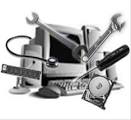
1. Install Antivirus Program & Scan Complete hard disk.
I think that the first step, that is probably most important, you should install fully functional antivirus program before doing anything else. Do not think that viruses can only reduce your computer speed, viruses can damage your entire files forever also. Computer viruses are self executing program that are made to modify the way a machine working without the permission of owner. Viruses drain memory on dangerous level resulting system crash and loss of data. The list of computer viruses is increasing rapidly. Viruses have different behavior. Some viruses active only when infected file is running while some other stay active in computer memory until you switch off PC. Here is a brief look about viruses, this will help you to understand the importance of Anti Virus Program.
There are six major categories of computer viruses:-
A. Boot Sector Virus :- Infects boot sector of Hard Disk/floppy disk.
B. File Infection Virus :- Attach modify any executable files, sometimes replacing the original code with its own.
C. Multiparty Virus:- A virus that behaves both like Boot Sector and File infection virus.
D. Network Virus :- Network viruses spread throughout the local area network and generally across the internet as well.
E. E-mail Virus :- Most of the time a e-mail virus is one of those types of computer viruses that is generally a macro virus and it will multiply itself by seeking out the other contacts in a e-mail address book and then send itself to those addresses in hopes that they will activate the virus too.
F. Macro Virus:- Macro viruses as the name implies, will infect files of programs that use macros in the program itself. The most common of these are the Microsoft Office files created in Excel spreadsheets, Word documents, Access databases, PowerPoint presentations and these type of files from AmiPro and Corel Draw and others.
-Install Antivirus and up date its virus database regularly.
-Run full system scan regularly.-Install Antivirus and up date its virus database regularly.
-Turn on windows firewall.
2. Clean up hard disk drives.
We should understand that computer has its limit, we should keep data in CD or DVD. Take some time to delete useless items that are on hard disk. Proper maintenance of you hard disk can help to keep your computer running more fast and smooth. In much the same way a messy room deters us from finding things, a disorderly hard disk makes it difficult for the computer to find files. We should divide data according to use and keep in a folder not directly on hard disk. Here are three steps that you can take to clean up your hard disk drive.
A. Delete Unused Files
Keep your hard disk well-organized and easy to navigate. Delete all unnecessary data and uninstall useless programs because this also frees up valuable hard drive space that can be used to store important files in the future.
B. Run Disk Cleanup Utility
A fast and easy way to clean up your hard disk is to use Microsoft Window’s disk cleanup utility under the system tools. You can configure that disk cleanup utility to delete temporary files, empty the recycled bin, and compress old files. The disk cleanup utility also gives you the option to uninstall unused programs and Windows components, and delete system restore points except for the most recent one.
C. Run Disk Derangement Utility
Another way to keep your hard disk neat and orderly is to run Window’s disk derangement utility. As we move, delete and install files in our computer, some large files will not be stored as one complete unit. Instead, they will be broken down into smaller parts and stored in between other files. File fragmentation makes it difficult for the computer to locate these separated files. The disk derangement reduces file fragmentation by sorting scattered files and placing them closer to each other. When you run the disk derangement it will assess your hard disk and advise you whether the disk needs to be fragmentation or not. Even if your computer is running smoothly now, observe proper hard drive maintenance so you can avoid future problems and keep your computer in the best possible condition.
3. Clean up Windows Desktop.
Computer works slowly if there are too many shortcuts or files on desktop. Every times when you run your PC, operating memory is used for the files that are on desktop. All the files, shortcuts and folders remain active as long as PC run. Imagine that you have 20 files or folders on desktop, they are all active on RAM because they are available for any time. It is better to keep your files on particular folder or in my document folder or create a shortcut of your folder on desktop to free up operating memory. This simple step makes your computer run faster.
4. Remove useless programs form Windows Start up.
These steps will help you to make your computer run more faster.
Liked My Post ?










 Need Mobile Help ! Discover More your mobile phone.
Need Mobile Help ! Discover More your mobile phone. Make faster your PC in some simple steps !
Make faster your PC in some simple steps ! Hidden Facebook Tricks ! Learn Now.
Hidden Facebook Tricks ! Learn Now. Download beautiful blogger template Free To Use.
Download beautiful blogger template Free To Use. Customize Your Blogger Template-Solved Out
Customize Your Blogger Template-Solved Out Reduce Internet Charges ! Learn how with many internet focused tutorials
Reduce Internet Charges ! Learn how with many internet focused tutorials






Nice DudE :)
ReplyDelete:)
Delete